|
|
| Vallecalda |
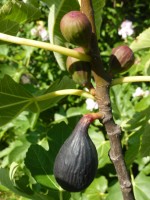
This fig tree was discovered in the Apennine Mountains (Italy), in a place named Vallecalda di Borgofornari, at an elevation of 550 meters. Despite the cold winters of the Apennine Mountains, this fig tree bears a significant and successful crop of brebas and a very large main crop, which usually doesn’t ripen.
In its natural habitat, Vallecalda reaches an important size, bears finely dissected leaves and produces many root suckers. This fig tree has an excellent resistance to cold.
Breba crop production is good and the fruits resist very well to sudden temperature changes, they usually don’t drop. The fruit is very palatable, melts in the mouth, is very sugary and has a very good perfume. The skin is quite thin and sweet. It is an excellent fruit.
In its natural habitat, the main crop fig does not ripen, but in Haute-Savoie (France), at a lower elevation (about 440 meters), fruits usually ripen. They are smaller than the breba fruits, but more numerous and have the particularity of being exceptionally resistant to bad weather conditions. The eye remains closed despite the autumn rains. This fig must not be harvested while being excessively mature, because as the skin is thick, it becomes hard when ripening, degrading the organoleptic qualities. However, when harvested ripe, it is a sugary fruit of very good quality.
Finally, Vallecalda is particularly adapted to cold areas, even in unfavorable situations, thanks to its natural resistance to cold and its excellent fruits.
|
| |
| General data |
| Origin |
Italy, Ligury |
| Synonym(s), local names |
Nero 400m, Nero 600m, ValleCalda di Borgofornari |
| Tree type |
Common |
| Crop |
Biferous |
| |
| Tree morphological characteristics |
| Shape |
Spreading |
| Vigor |
Strong |
| Ability to produce suckers |
Strong |
| Height after 10 years |
400 cm |
| Width after 10 years |
400 cm |
| Minimum width |
400 cm |
| |
| Branch morphological characteristics |
| Branch color |
Brown, green |
| Caliber |
Medium |
| Buds |
Dark red, violet |
| |
| Leaves morphological characteristics |
| Leaves |
Average |
| Lobs |
5 |
| Depth |
Very deep sinuses |
| |
| Adaptation outside the Mediterranean area |
| Cold hardiness |
Excellent |
| Wind resistant |
Excellent |
| Pot culture |
|
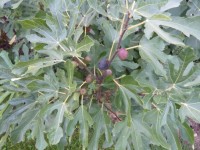 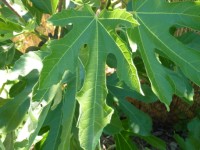
| Yield |
Good |
| Fruits dropping |
Partial fruit drop |
| Alternance |
None |
| Sensitivity to splitting |
Very resistant |
| Crop begin date (day-month) |
Valleiry:25-07 |
| |
| External characteristics |
| Skin color |
Black |
| Skin thickness |
Thin |
| Shape |
Pyriform |
| Stalk |
Does not break off readily |
| Stalk shape |
Medium and thick |
| Neck |
Quite long |
| Neck color |
Red |
| Eye |
Medium, closed |
| Eye color |
Black |
| Average weight (grams) |
35 g |
| |
| Internal characteristics |
| Pulp color |
Dark red |
| Seeds |
Felt, many |
| |
| Organoleptic evaluation |
| Texture |
Melts in the mouth |
| Sugar |
Sweet |
| Taste |
Very good |
| Perfume |
Medium |
| Organoleptic descriptors |
Floral, Fruity, Strawberry, Melon |
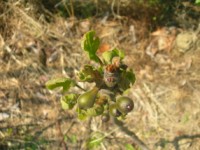 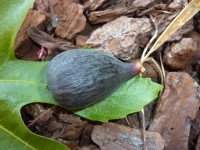 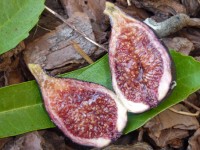
| Yield |
Very Strong |
| Fruits dropping |
No fruit drop |
| Alternance |
None |
| Sensitivity to splitting |
Very resistant |
| Crop begin date (day-month) |
Valleiry:21-09 |
| |
| External characteristics |
| Skin color |
Blue, black |
| Skin thickness |
Very thin |
| Shape |
Pyriform |
| Stalk |
Breaks off readily |
| Stalk shape |
Medium length and width |
| Neck |
Quite long |
| Neck color |
Blue, black |
| Eye |
Very small, closed |
| Eye color |
Blue, black |
| Average weight (grams) |
25 g |
| |
| Internal characteristics |
| Pulp color |
Dark strawberry |
| Seeds |
Felt, few |
| |
| Organoleptic evaluation |
| Texture |
Melts in the mouth |
| Sugar |
Sweet |
| Taste |
Very good |
| Perfume |
Medium |
| Organoleptic descriptors |
Floral, Fruity, Strawberry |
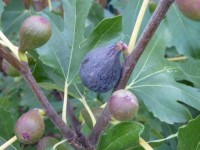 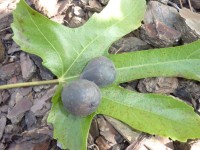 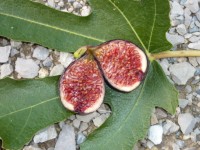
|








